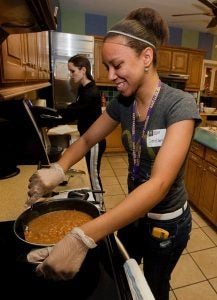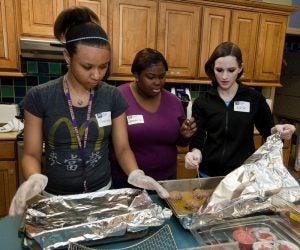Campus Kitchen transitions to student leadership

Serdaria McKinnon-Smith, front, stirs beans to prepare dinner at the Ronald McDonald House earlier this week. With her is Katie Crifasi.
GREENVILLE (Jan. 28, 2011) — In little less than a year, East Carolina University’s Campus Kitchen has saved more than 1,300 pounds of food from being wasted and served more than 1,500 meals.
These milestones have come courtesy of more than 360 students, led by an AmeriCorps VISTA coordinator. But now, the students are taking charge.
A leadership team of eight student volunteers voted Jan. 20 to decide key positions in Campus Kitchen’s hunger relief operations, meaning that eventually their efforts will be student-run.
“They’ve really taken it upon themselves to help the program grow,” said Katie Winn, who coordinates the program through AmeriCorps VISTA, the national service program.
Campus Kitchen opened its doors at ECU’s Todd Dining Hall in February 2010. Part of a national hunger relief effort, the project works with Aramark to collect unused food from the university’s dining facilities.
Supplemented by items donated through food drives, Campus Kitchen volunteers twice a week prepare food for children and families at the Ronald McDonald House, which houses families of children receiving medical treatment, and the Little Willie Center, an after-school program.
“We want to serve complete meals,” Winn said. “We’ve had everything from hamburgers on the grill to pasta salad and pasta bakes and casseroles.”
Running the program takes varied talents including logistical skills, marketing know-how and cooking ability. Student leaders all receive ServSafe certification, a food-safety training credential. They all commit regular hours to the project and oversee other volunteers.
Katie Crifasi, a member of the leadership team and graduate student studying cell biology, joined the project because it offers so many ways to help others. Not only does Campus Kitchen help the university be more efficient, she said, it also helps the Little Willie Center and the Ronald McDonald House serve families and children.
“Everybody’s just really grateful,” she said. “It sounds really simple — you’re just making dinner for someone, but it really makes things easier on a family.”
Preparing meals for others is also fun, she said.
“Sometimes, just like any kitchen, we think, ‘Did we put too much seasoning in this one? Should we do it this way?’” Crifasi joked. “We look at our cake and think, maybe our moms wouldn’t be proud of us for this one, but hopefully it still tastes good.”
More than 360 volunteers have logged more than 880 hours of service, Winn said, and the program has no trouble attracting help from students.
Winn will continue to advise students through the end of the year, when her VISTA assignment ends. The federal program, founded in 1965 to fight poverty, provides a living stipend and other benefits in exchange for a year’s service.
“We will always have a supervisor for the kitchen,” Winn said. “The intention is to have another VISTA, just not one to be as involved.”
Volunteers hope the operation raises awareness about hunger and food insecurity, she said. Since the economic downturn began, food banks around the country have reported sharp increases in demand.
“There is a whole new face of poverty that is coming around with the recession,” Winn said. “There are a lot of people who on the outside look like average-income people, but they go to bed hungry at night. It’s becoming a really ubiquitous issue. People really need help.”

Campus Kitchen, a project that distributes surplus food from campus dining halls to social service organizations, has new student leaders after a recent vote. The hunger relief effort is gradually becoming a student-run operation. Serdaria McKinnon-Smith, Shoneice Sconyers and Katie Crifasi, from left, check the temperature on hamburgers to be served at the Ronald McDonald House.